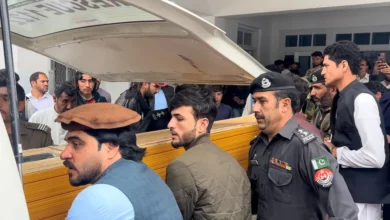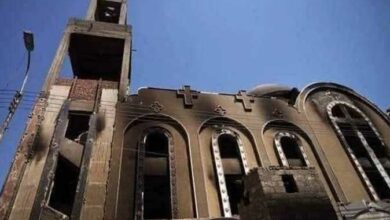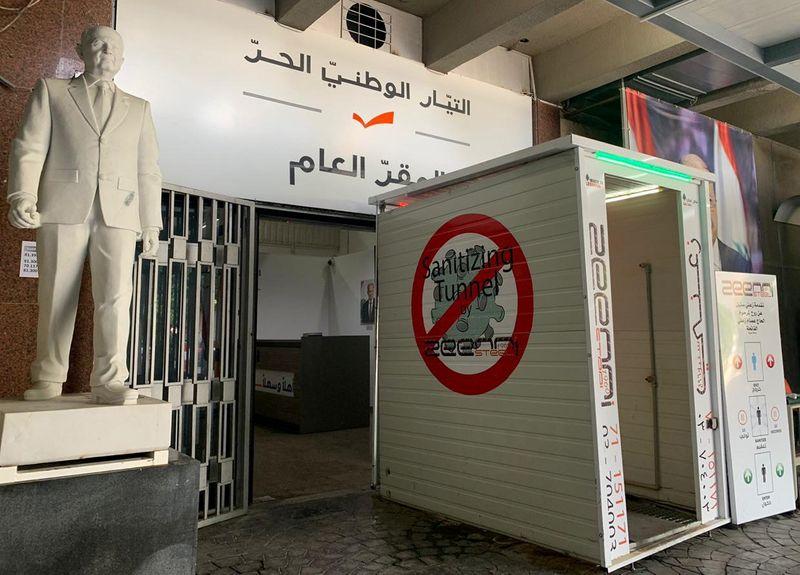A state-sanctioned fact-finding commission said on Wednesday that “thugs” were involved in the sectarian clashes that lead to the deaths of at least 15 people and the burning of a church last week in the Cairo neighborhood of Imbaba.
The violence erupted after a group of bearded men in robes “believed to be Salafis”, along with other residents of the low-income neighborhood, rallied outside the Saint Mina Coptic church under the pretext of rescuing a woman who was allegedly being held captive inside, according to a report issued by a fact-finding commission appointed by the National Council for Human Rights, a semi-governmental human rights monitoring organization.
“During this illegal and unjustified gathering around Saint Mina Church, bullets were fired at the crowd but the commission could not identify the source,” the report says.
Eventually, the crowd became furious and clashes ensued, according to the report.
In the meantime, “groups that could be described as thugs” rushed to another church two kilometers away, carrying shotguns and melee weapons, including knives and clubs.
“Outside the church, the aggressors got divided into two groups: one fired bullets in the air to prevent people from interfering to protect the church and the other stormed into the church and set it on fire,” says the report.
Despite saying that thugs played a role in the attack, the commission refrained from confirming whether or not the attack was premeditated.
“The whole incident or part of it might have been premeditated. We are not ruling out that possibility. But we were keen on mentioning what we have evidence about,” said Diaa Rashawan, a political analyst and a member of the commission, at the news conference after the release of the report.
Although the monitors admitted they had no evidence of any plot, their report included a clause that accused the remnants of Mubarak’s regime of instigating disputes to thwart the revolution.
Yet, earlier, another commission member had told reporters that the attack was plotted in advance.
“The type of weapons used, including live ammunition, and the way [the Molotov] cocktails looked prepared in advance prove that the incident was premeditated,” said Hafez Abou-Saeda, secretary general of the Egyptian Organization for Human Rights and a member of the commission. The statement was later identified as being Abou-Saeda’s personal opinion, rather than the commission’s conclusion.
Thuggery stands out as one of the most notorious legacies of former President Hosni Mubarak’s regime. Thousands of ex-convicts and thugs were habitually deployed by Mubarak’s security apparatus and the now-dissolved National Democratic Party (NDP) to crush political opponents during voting and at protests.
Earlier this week, military sources told the Egyptian press that the armed forces had obtained information about a plot to plunge the country into civil war through the provocation of sectarian feuds. The perpetrators of the plot are remnants of the former regime, specifically the NDP, according to the sources. Such plots are believed to be attempting to sabotage the revolution and spread chaos.
More than 200 people were arrested this week, including the two prime suspects: a Muslim man who allegedly claimed that his wife was hidden in the church for converting to Islam, and a Christian cafe owner who was accused of being the first to open fire.
Prime Minister Essam Sharaf ordered on Tuesday the referral of suspects to an emergency state security court.
The commission said it could not identity who opened fire first, but blamed both Muslims and Christians for deploying ammunition.
“What we know for sure is that all kinds of weapons were used to fire bullets… Fifteen people were killed, half of them are Christian and the other half are Muslim, which proves that there was an exchange of bullets between the two parties,” Rashwan said.
The report also highlights the weakened public order and the resurgence of fundamentalist ideas that discriminate against Copts as reasons behind the renewal of sectarian clashes.
Finally, it recommended an immediate and fair trial for the suspects, a prompt redeployment of police forces, especially around houses of worship and in low-income neighborhoods, and the promulgation of new laws to stem sectarianism.




